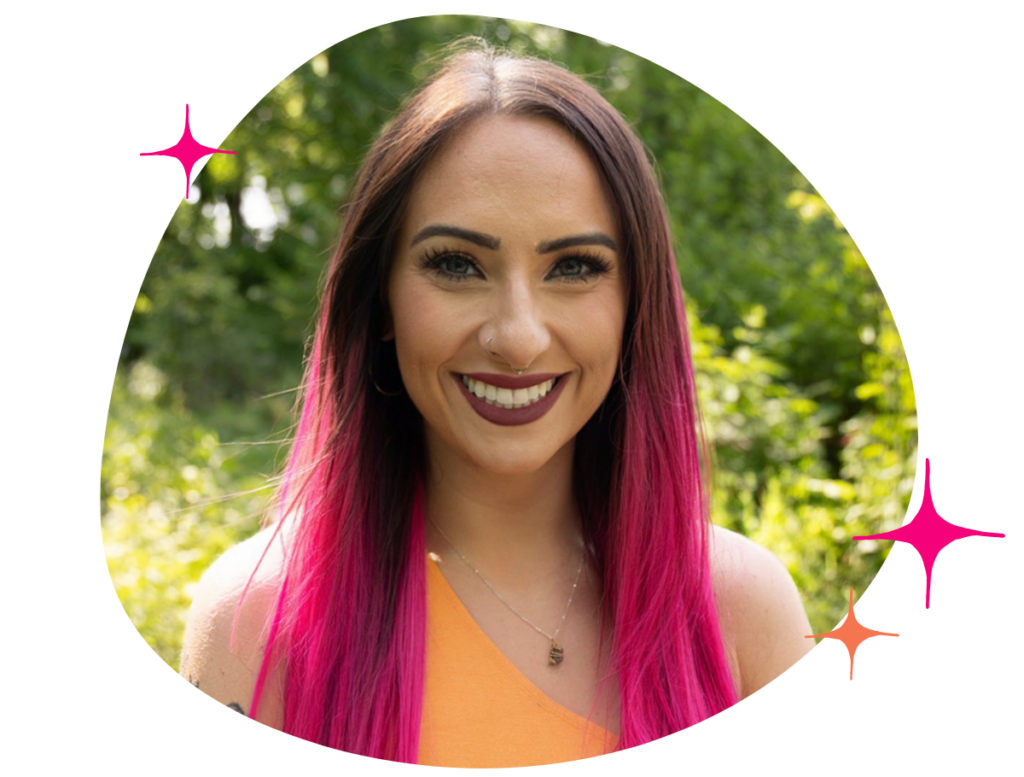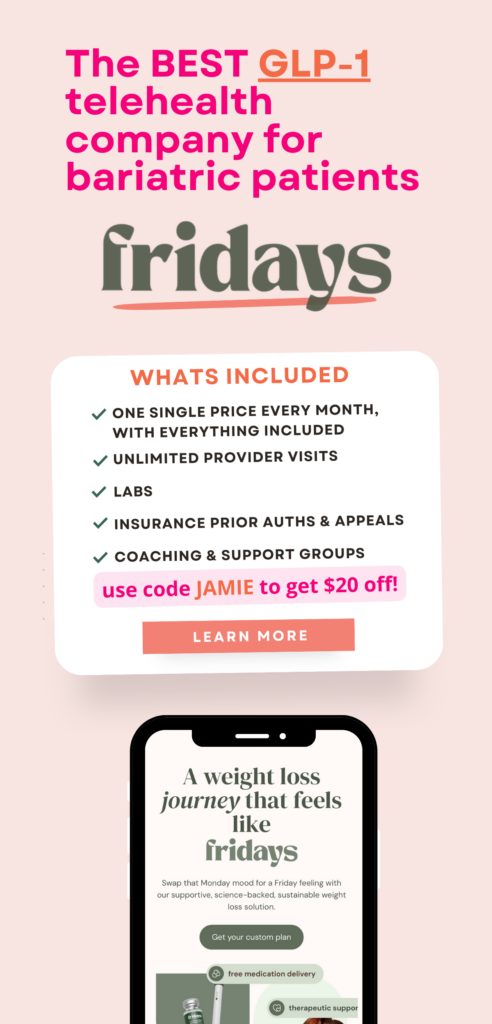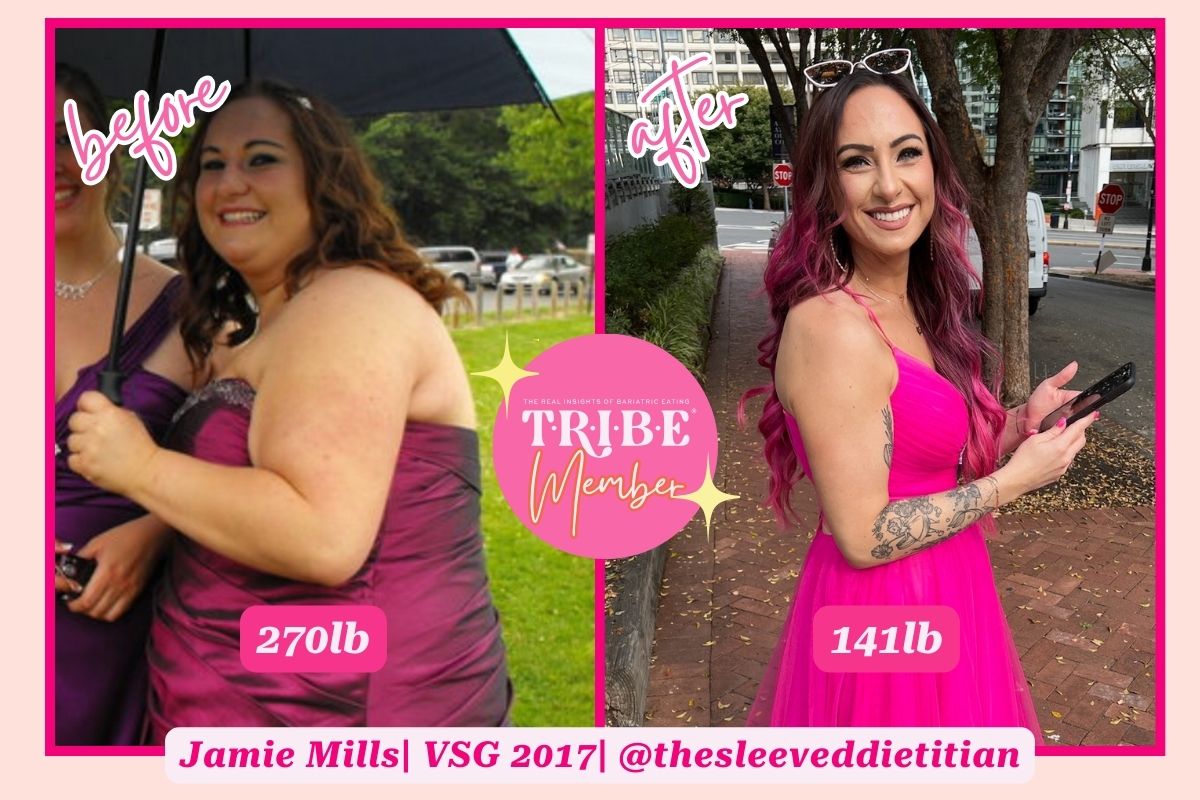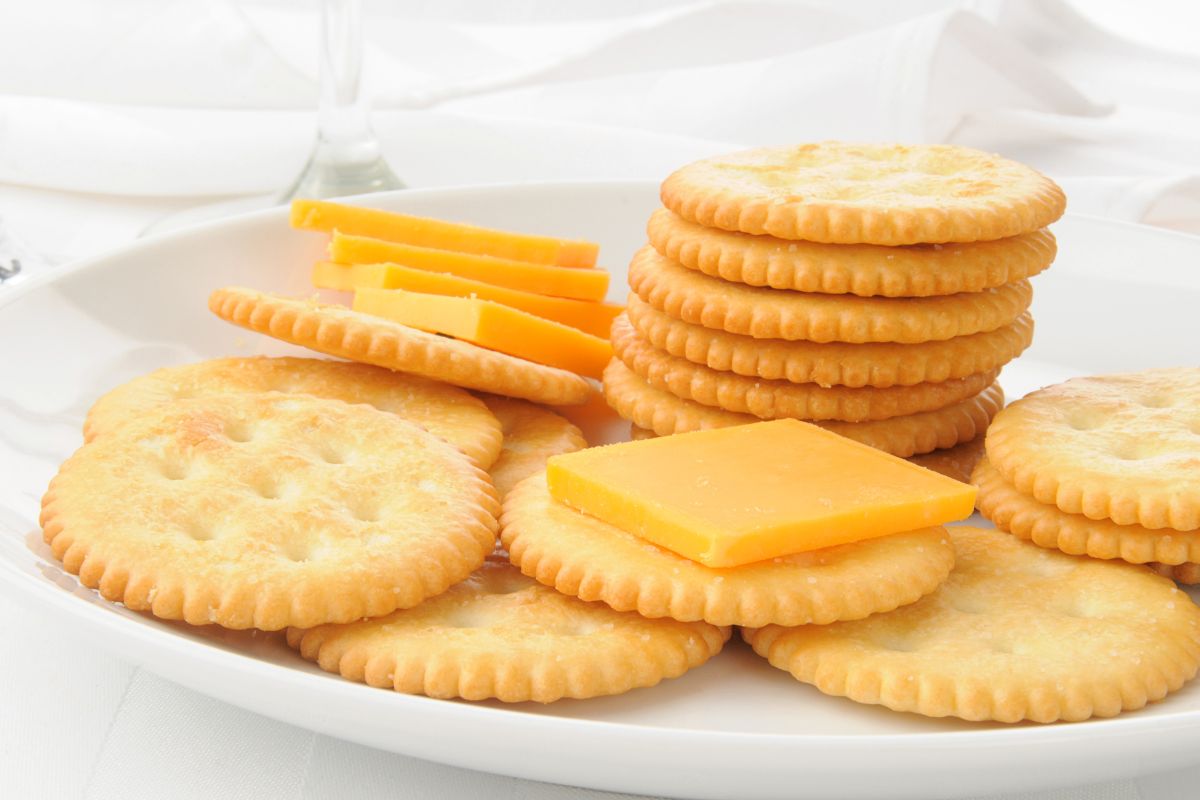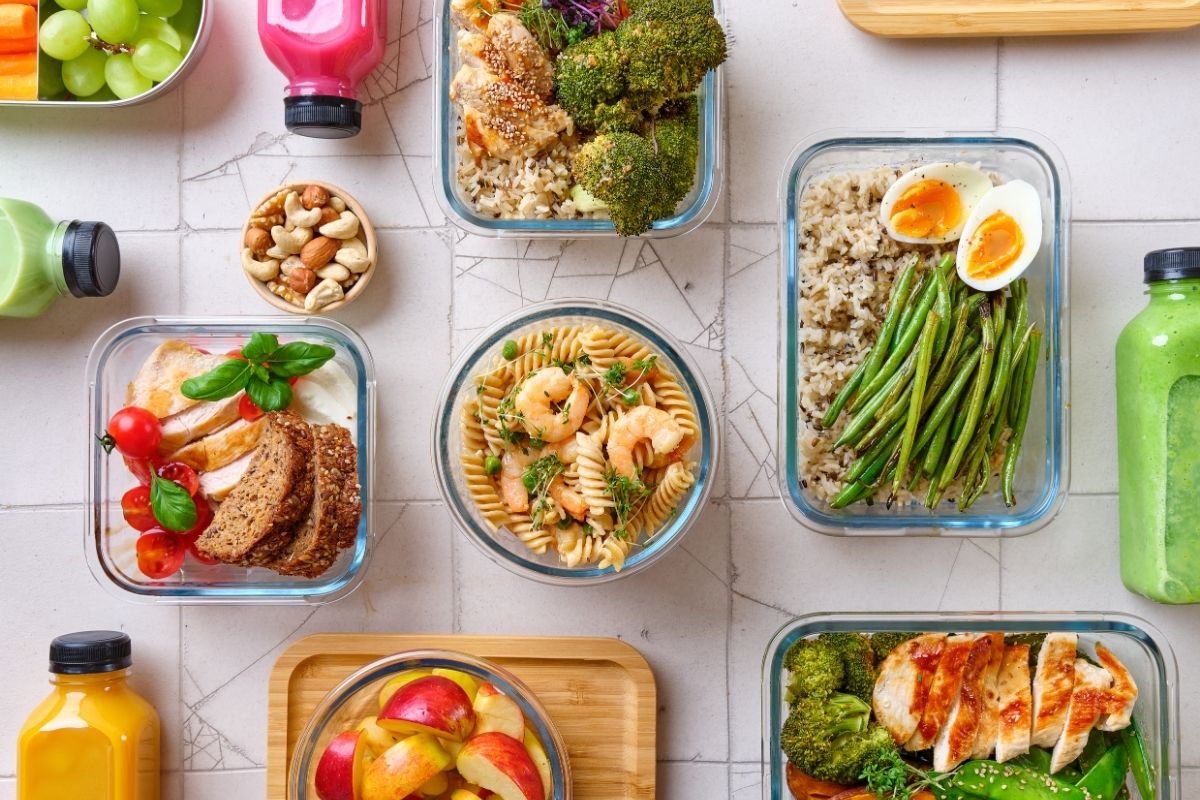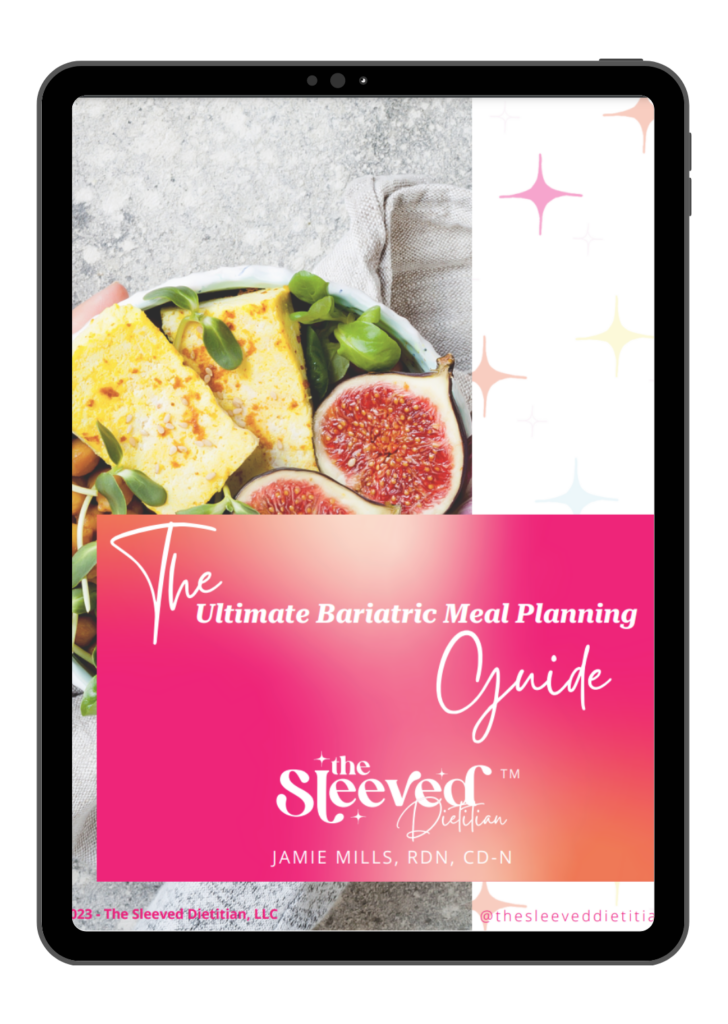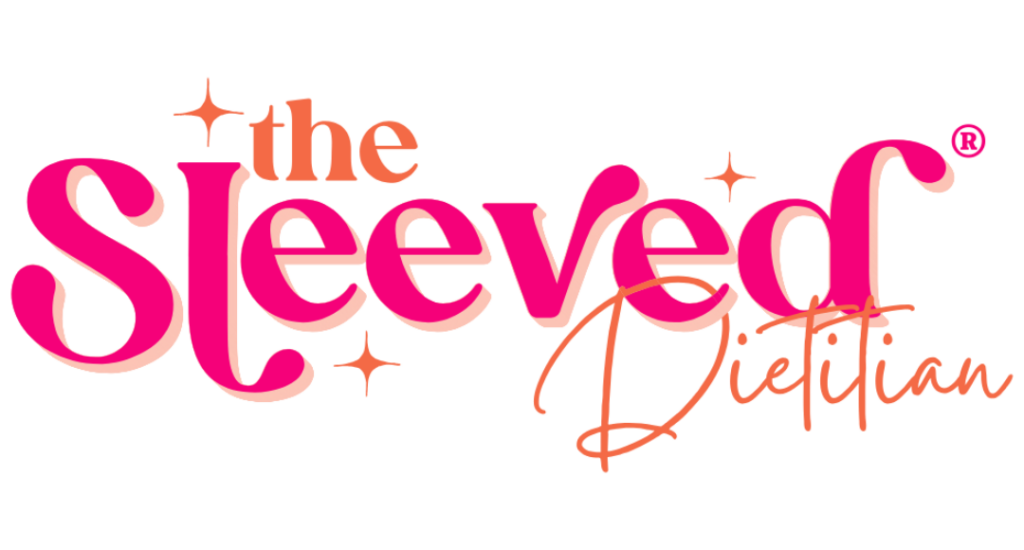Hey Babe, you’ve probably heard of “Mindful Eating” and “Intuitive Eating,” but what do they mean exactly? Are they the same? And even more important: is Intuitive Eating a good fit for you, after weight loss surgery?
The answer for both: is no. I’ll explain.
Mindful Eating and Intuitive eating are different but the two approaches have some overlap.
Let’s talk about what each means and which works best for life after surgery!
(Are you new here? Let me roll out the pink welcome mat! My name is Jamie, and I’m the registered dietitian leading my T.R.I.B.E. of peeps through learning how to eat – and thrive – after weight loss surgery.)
Let’s kick off this post with a quick intro to mindful eating.

What is mindful eating?
Mindful eating is all about enjoying a meal or snack without distraction. Screens are the most common reason we are not eating mindfully.
Rather than camping out in front of your laptop or Netflix while you nibble on lunch, mindful eating is about putting away distractions and focusing on each bite.
This means noticing the sensations of eating. How does it feel on your tongue? Once you bite into it, does the flavor change? How does the food move around your mouth as you chew it?
When you eat mindfully, you focus on the smallest details and are able to enjoy your meal, feel your fullness and stop eating when the time is right. While important for anyone, this is especially important for you after weight loss surgery.
While there is some overlap with Intuitive Eating, mindfulness isn’t the same.
What is Intuitive Eating?
Intuitive Eating is really having a star moment; many registered dietitians and Instagram influencers are promoting it. And for good reason; there is a lot of research to back up Intuitive eating…unless you’ve gone through weight loss surgery.
Intuitive eating is not the same as mindfulness (2). Intuitive Eating is about learning to connect with your own hunger and fullness cues instead of managing your meals with a diet app, counting calories, or managing your macros. With Intuitive Eating, there are no good or bad foods and you release guilt or shame about your choices: food is food.
Now, that doesn’t mean you need to track every bite you eat post op nor does it mean we are over her categorizing foods as good or bad. However, after weight loss surgery we often need to rely on other tools to help us meet our needs or know how much we should be eating.
The dietitians who came up with the idea aimed to help people let go of harmful beliefs they have about eating and about themselves. Letting go of harmful beliefs and shame is a great thing that benefits all of us.
One other disconnect? Intuitive Eating never has the goal of intentional weight loss. For anyone who has had WLS, weight loss is the goal.
While Intuitive Eating works for some people, life after surgery is not intuitive. Your eating plan is a medical necessity. This is kind of like if you had a peanut allergy but were craving a PB&J. It doesn’t matter if that childhood classic sounds really good, it isn’t a safe option for you to eat. Ever.
Or, if you had diabetes but were craving a huge slice of mocha chocolate cake; leaning into this craving would likely be dangerous for your blood sugar.
Because of this, I don’t recommend Intuitive Eating after weight loss surgery. Intuitive Eating doesn’t provide the right guidance for you to be successful – or safe – after bariatric surgery.
Point blank: Intuitive Eating isn’t a good fit after WLS.
What can you do instead? Let’s talk about other ways you can approach eating post-op.
Life after surgery is not intuitive
Immediately after surgery, your eating habits change as you heal and your stomach adjusts to your new diet.
And while the nitty gritty of your recommendations might vary from one surgery center to another, I can guarantee that they are not intuitive.
Why? You’ve had a surgical procedure that completely changes the way that your stomach communicates hunger and fullness cues to your brain.
For a while, you might not feel hunger at all. But you’ve still gotta eat. Later, if your hunger (and cravings) comes back really strong, you still have to prioritize making a nourishing plate that starts with protein.
In order for you to heal and thrive, you have to carefully manage how you eat and when. You have to use your brain to make good, practical decisions because you can’t rely on your stomach to send the right memo. If you were to solely lean into IE, and only choose what you want vs what you need, you aren’t going to continue to control your hunger or weight.
So take what you can from Intuitive Eating and mindful eating: be mentally present while you’re eating, remove shame and stigma, and then use your brain to make the decisions that nourish your new stomach.
Let’s call it intentional eating, shall we?
Intentional is a better fit
Since eating after bariatric surgery is not intuitive, it can be easier to adjust to your new lifestyle with a more intentional approach.
This is especially important because your new post-op diet is a medical necessity that doesn’t come naturally. To avoid malnutrition and nutrient deficiencies, you’ll have to build an “intentional” bariatric plate that keeps you on track after your procedure.
Instead of focusing on Intuitive Eating – paying attention to hunger cues and emotional eating – intentional eating allows you to build a plate that nourishes your body and slow down and enjoy the rich smells, delicious flavors, and unique textures of every bite.
And since your new eating habits won’t always follow hunger cues, taking the time to slow down and be present with your food can help you feel satisfied and appreciate fun flavors and small details you didn’t notice about your food before. Finding pleasure in your meals helps you to stay on track with your new post-op eating plan.
Practical choices to promote weight loss
You can buy a hammer, but it won’t build a house for you.
Remember, bariatric surgery is a tool to help you on your weight loss journey, but it will not do the work for you. Your surgery team’s recommendations are meant to be taken seriously and if you follow them, you can see big changes in your life!
Here are some practical ways to promote weight loss.
Prioritize Protein
The 3-6 months of counseling before your procedure are designed to prepare you for the road ahead. It may be a big change for you to follow such a regimented eating plan, but it is really important to follow the recommendations of your weight loss surgery team.
Prioritizing protein is something that will quickly become ingrained. And for good reason. When you meet your daily recommended protein intake (your dietitians will give you personalized recommendations) you’ll give your body the right nutrients to heal from surgery, stay healthy and lose weight (1).
Don’t drink at meals
Your pouch is quite small after surgery. If you drink while you’re eating, the drink pushes the solid food through your pouch too quickly. Spoiler: this completely defeats the purpose of the surgery, which is to stay full as long as possible (2). Talk about shooting yourself in the foot!
To avoid this, your surgical team will recommend the 30-minute rule to keep your pouch from emptying too fast (3). The 30-minute rule means not drinking anything a half hour before or after your meals, and sipping fluids the rest of the time.
Exercise regularly
Walking right after surgery can be a great way to enjoy your exercise. Start small, just 10 minutes a day, if that’s what you can tolerate. Be mindful of how you talk to yourself and remember why you started this journey in the first place!
As you get comfortable with 10 minutes add 1 more minute – just 60 seconds – every day. Keep going until you can work up to 30 minutes of walking at a brisk pace, 5 days a week. (4)
Find what fits
To reach your future goals, you’ll have to follow your post-op diet, and you can make the process easier by eating foods you actually enjoy. Yes, your diet will be different, and it will take some time to adjust to your new lifestyle, but if you can find foods you like within your post-op diet, the journey will become a bit easier.
Plus, when you pair foods that you like with intentional eating you’ll be able to slow down and appreciate how every bite smells, tastes, and feels as you eat it.
Time for tough love
This surgery is a tool, not the easy way out! And it can change your life for the better if you use it properly. It is so important to follow your surgeon’s plan to see success on this journey. Even on the days when you don’t feel like it.
I’ve actually had WLS, so I am both a registered dietitian and someone who has been in your shoes. I understand firsthand what it feels like to go through this surgery and recovery…it’s a lot!
Remember why you started this journey in the first place. What are your health goals and why? This can help you focus on the bigger picture as you learn to live in a new way. Even when you don’t feel like eating, it’s important to give your body the nutrients it needs.
It will take time and practice, but I promise you can learn how to fuel your body right!
Key takeaways
Thanks for reading, Babe! I’m proud of you for taking charge of your weight and health. WLS is a challenging road, but you can do hard things. While some of the principles of Intuitive Eating and mindful are valuable – such as removing shame from eating – they’re not all of the tools that you need to be successful with weight loss surgery.
And remember, you don’t need to subscribe to one ideology in order to be healthy. Take what you learned here about IE and mindful eating and channel it into your intentional routine. This empowers you to hit your goals and be successful long term.
Eating such small portions does not come naturally to us after surgery. Instead, eat your meals with intention and really focus on making your protein plate and on enjoying the experience rather than your body’s unreliable hunger cues.
Here
Life after surgery is no easy task, but you’ve got this Babe! I’m not a big rule person, but there are certain requirements after surgery that are non-negotiable to make this journey work for you. And when you stick to them you’ll be shocked at what you’re capable of.
You may have a list of what you’re supposed to do after surgery…but do you feel lost with how to actually do it? I can help.
I’ve got a freebie with you in mind: the Ultimate Bariatric Meal Planning Guide which walks you through my tried and true method for planning meals for WLS success. You’ll feel so much more confident once you learn this method.
If you’re feeling lonely or overwhelmed, I’d love to help. No one should feel like they’re going through this alone. This is a time of growth and learning in your life and you DO have what it takes to get through it. Plus, if you join T.R.I.B.E., an entire community of pre- and post-op bariatric babes are right here when you need them.

